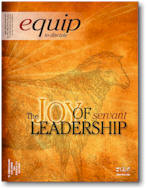 The question we are often asked in a variety of ways has to do with the role and function of leaders in the body of Christ, the church, and more broadly, in the kingdom. The question usually asked is, “Who are leaders and what are their performance expectations?”
The question we are often asked in a variety of ways has to do with the role and function of leaders in the body of Christ, the church, and more broadly, in the kingdom. The question usually asked is, “Who are leaders and what are their performance expectations?”
In the opening lecture of our video series on the eldership, Elders, Executives or Servants, I point out that every organization has two kinds of leader-formal and informal. The formal are those who are in an official position of leadership, either by appointment or election. The informal leaders are the men and women that have substantial influence in the organization but do not hold an official leadership role. While organizations are quick to recognize the existence of the formal leaders, in our case the church officers, they have often failed to recognize the existence of the informal leaders. Some of you may remember the film Pollyanna. In that story a very wealthy and influential woman in the town, known as Aunt Polly, determined many things in that town, including things related to the church. She was an example of an informal leader with power and influence. We have been called into situations where churches are being ripped apart because of the conflict between the informal and formal leadership. In a few cases such struggles resulted in a church split.
Click here to read entire publication in PDF (Acrobat Reader required)
We have also been in churches where the formal leadership and the followers were in conflict over certain issues that jeopardized the church’s life. The lead article on the eldership clearly reminds us that God established leaders, formal leaders, to oversee or watch over the local church. The article clearly reflects that biblical nature and posture of the role of the eldership. This is important because when we think of the church and its mission, we are reminded that the church is both an organism and an organization, or an organized organism. Actually, that’s the only way we can think of the church on earth, because that is the way God designed it-a living organism with design and purpose. We might say that the church is a structured organism. Further, the Apostle Paul tells us that God orchestrated the church, each part just as he wants it. Some are in the position of leadership while others are followers; yet both are extremely important to the design.
In my doctrinal dissertation a number of years ago, in the section on leadership, I highlighted three major points regarding leadership that I found in the writings of Richard Hutcheson, a Presbyterian Clergy in Washington D.C.
First, we must have a theology of leadership. Part of this theology is recognizing that every leader has a distinct calling and gifts in specific areas, just as the church has a distinct mission. Second, there is the pragmatic side of leadership. Hutcheson said that leaders must know how to use the leadership and managerial skills in a way that is compatible with our theology, especially our understanding of the church’s role.
Third, leadership has an evaluative role. This means that the leadership is asking the right questions: How effective are we in carrying the mission that God has assigned to our church? Are we effectively carrying out our church’s mission? Are our leaders using their specific God-given gifts? Are we using our leadership and management skills theologically to set the vision for the church’s mission?
What this means is that the church’s leaders, while viewing themselves as shepherds, must be trained in the best of leadership skills, starting with doctrine and theology. Leaders of the church should also have skills and techniques to be capable of leading in the broader kingdom. However, to avoid the temptation of simply adopting the world’s way of leadership, or to take the very opposite “fundamentalist” approach of proof texting everything we do, we must work together to integrate all the principles of leadership that we know into our theological framework. As effective leaders, we do not simply adopt the ways of the world in carrying out our responsibilities, nor do we narrow our scope by feeling as though we have to quote scripture and verse for all that we do.
God’s body, the church, or any other kingdom entity, is not to be carelessly and sloppily arranged. The church is made up of people, and the Apostle Paul says that the church is more or less effective, “as each part does its work.” The role of the leadership is to help each and every part (person) know where he or she fits into the body and what function they are to carry out. That does not automatically happen. It requires knowing our mission, knowing our people, and knowing how to lead them forward in their mission and purpose. Any organization, especially the church, must know and demonstrate how leaders and followers work together to carry out and accomplish their mission of equipping people to live as kingdom disciples in a fallen world.
